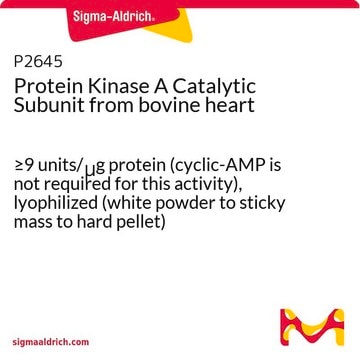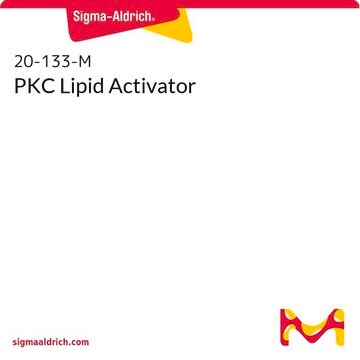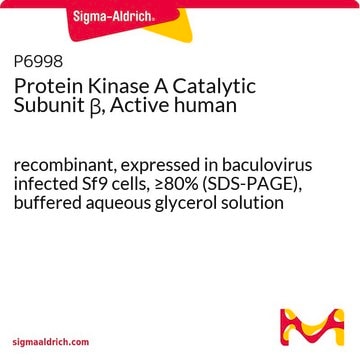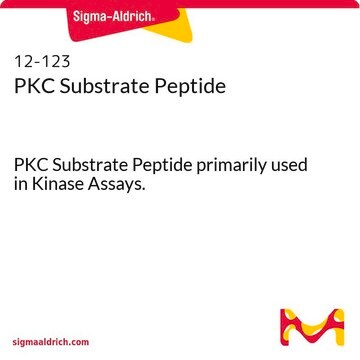SCP0212
PKA Substrate
≥95% (HPLC), lyophilized
Se connecterpour consulter vos tarifs contractuels et ceux de votre entreprise/organisme
About This Item
Formule empirique (notation de Hill):
C39H74N20O12
Poids moléculaire :
1015.13
Code UNSPSC :
12352204
Nomenclature NACRES :
NA.32
Produits recommandés
product name
PKA Substrate,
Pureté
≥95% (HPLC)
Forme
lyophilized
Composition
Peptide Content, ≥60%
Conditions de stockage
protect from light
Température de stockage
−20°C
Amino Acid Sequence
Gly-Arg-Thr-Gly-Arg-Arg-Asn-Ser-Ile-NH2
Description générale
cAMP-dependent protein kinase (PKA) Substrate (GRTGRRNSI-NH2) is a nine amino acid phosphorylatable substrate of cyclic adenosine monophosphate (cAMP)-dependent protein kinase.
Application
cAMP-dependent protein kinase (PKA) Substrate has been used as a peptide substrate for Plasmodium cyclic guanosine monophosphate (GMP)-dependent protein kinase in enzymatic assay and inhibition assay. It has also been used as a positive control in the in vitro protein kinase A (PKA) phosphorylation assay.
Code de la classe de stockage
11 - Combustible Solids
Classe de danger pour l'eau (WGK)
WGK 3
Point d'éclair (°F)
Not applicable
Point d'éclair (°C)
Not applicable
Certificats d'analyse (COA)
Recherchez un Certificats d'analyse (COA) en saisissant le numéro de lot du produit. Les numéros de lot figurent sur l'étiquette du produit après les mots "Lot" ou "Batch".
Déjà en possession de ce produit ?
Retrouvez la documentation relative aux produits que vous avez récemment achetés dans la Bibliothèque de documents.
Michael J Moore et al.
The Journal of biological chemistry, 278(12), 10613-10618 (2002-12-25)
For optimal activity the catalytic subunit of cAMP-dependent protein kinase requires a phosphate on Thr-197. This phosphate anchors the activation loop in the proper conformation and contributes to catalytic efficiency by enhancing the phosphoryl transfer rate and increasing the affinity
Jacqueline B Pierce et al.
Eukaryotic cell, 13(2), 209-230 (2013-12-04)
The two main signal transduction mechanisms that allow eukaryotes to sense and respond to changes in glucose availability in the environment are the cyclic AMP (cAMP)/protein kinase A (PKA) and AMP-activated protein kinase (AMPK)/Snf1 kinase-dependent pathways. Previous studies have shown
Q Ni et al.
Protein science : a publication of the Protein Society, 9(9), 1818-1827 (2000-10-25)
The binding of the methylanthraniloyl derivatives of ATP (mant-ATP), ADP (mant-ADP), 2'deoxyATP (mant-2'deoxyATP), and 3'deoxyATP (mant-3'deoxyATP) to the catalytic subunit of protein kinase A was studied to gain insights into the mechanism of nucleotide binding. The binding of the mant
Maria Penzo et al.
Scientific reports, 9(1), 7005-7005 (2019-05-09)
Antimalarial drug resistance compels the quest for new compounds that target alternative pathways to current drugs. The Plasmodium cyclic GMP-dependent protein kinase (PKG) has essential functions in all of the major life cycle developmental stages. An imidazopyridine PKG inhibitor scaffold
Manu Vanaerschot et al.
Cell chemical biology, 27(7), 806-816 (2020-05-04)
The search for antimalarial chemotypes with modes of action unrelated to existing drugs has intensified with the recent failure of first-line therapies across Southeast Asia. Here, we show that the trisubstituted imidazole MMV030084 potently inhibits hepatocyte invasion by Plasmodium sporozoites
Notre équipe de scientifiques dispose d'une expérience dans tous les secteurs de la recherche, notamment en sciences de la vie, science des matériaux, synthèse chimique, chromatographie, analyse et dans de nombreux autres domaines..
Contacter notre Service technique







